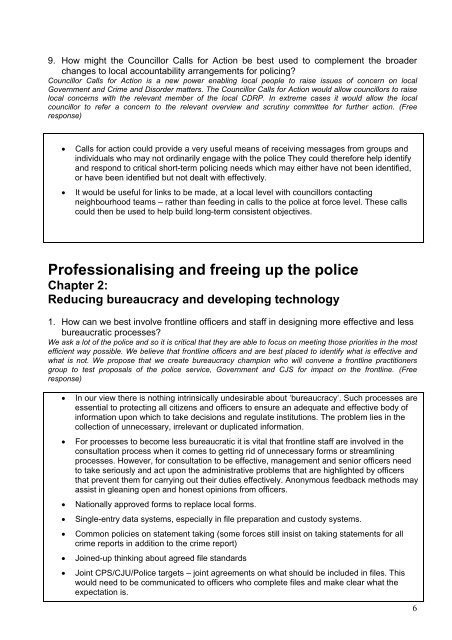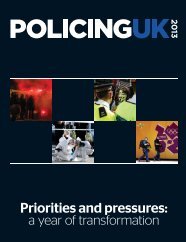THE POLICING GREEN PAPER - Police Federation
THE POLICING GREEN PAPER - Police Federation
THE POLICING GREEN PAPER - Police Federation
Create successful ePaper yourself
Turn your PDF publications into a flip-book with our unique Google optimized e-Paper software.
9. How might the Councillor Calls for Action be best used to complement the broader<br />
changes to local accountability arrangements for policing?<br />
Councillor Calls for Action is a new power enabling local people to raise issues of concern on local<br />
Government and Crime and Disorder matters. The Councillor Calls for Action would allow councillors to raise<br />
local concerns with the relevant member of the local CDRP. In extreme cases it would allow the local<br />
councillor to refer a concern to the relevant overview and scrutiny committee for further action. (Free<br />
response)<br />
• Calls for action could provide a very useful means of receiving messages from groups and<br />
individuals who may not ordinarily engage with the police They could therefore help identify<br />
and respond to critical short-term policing needs which may either have not been identified,<br />
or have been identified but not dealt with effectively.<br />
• It would be useful for links to be made, at a local level with councillors contacting<br />
neighbourhood teams – rather than feeding in calls to the police at force level. These calls<br />
could then be used to help build long-term consistent objectives.<br />
Professionalising and freeing up the police<br />
Chapter 2:<br />
Reducing bureaucracy and developing technology<br />
1. How can we best involve frontline officers and staff in designing more effective and less<br />
bureaucratic processes?<br />
We ask a lot of the police and so it is critical that they are able to focus on meeting those priorities in the most<br />
efficient way possible. We believe that frontline officers and are best placed to identify what is effective and<br />
what is not. We propose that we create bureaucracy champion who will convene a frontline practitioners<br />
group to test proposals of the police service, Government and CJS for impact on the frontline. (Free<br />
response)<br />
• In our view there is nothing intrinsically undesirable about ‘bureaucracy’. Such processes are<br />
essential to protecting all citizens and officers to ensure an adequate and effective body of<br />
information upon which to take decisions and regulate institutions. The problem lies in the<br />
collection of unnecessary, irrelevant or duplicated information.<br />
• For processes to become less bureaucratic it is vital that frontline staff are involved in the<br />
consultation process when it comes to getting rid of unnecessary forms or streamlining<br />
processes. However, for consultation to be effective, management and senior officers need<br />
to take seriously and act upon the administrative problems that are highlighted by officers<br />
that prevent them for carrying out their duties effectively. Anonymous feedback methods may<br />
assist in gleaning open and honest opinions from officers.<br />
• Nationally approved forms to replace local forms.<br />
• Single-entry data systems, especially in file preparation and custody systems.<br />
• Common policies on statement taking (some forces still insist on taking statements for all<br />
crime reports in addition to the crime report)<br />
• Joined-up thinking about agreed file standards<br />
• Joint CPS/CJU/<strong>Police</strong> targets – joint agreements on what should be included in files. This<br />
would need to be communicated to officers who complete files and make clear what the<br />
expectation is.<br />
6
















